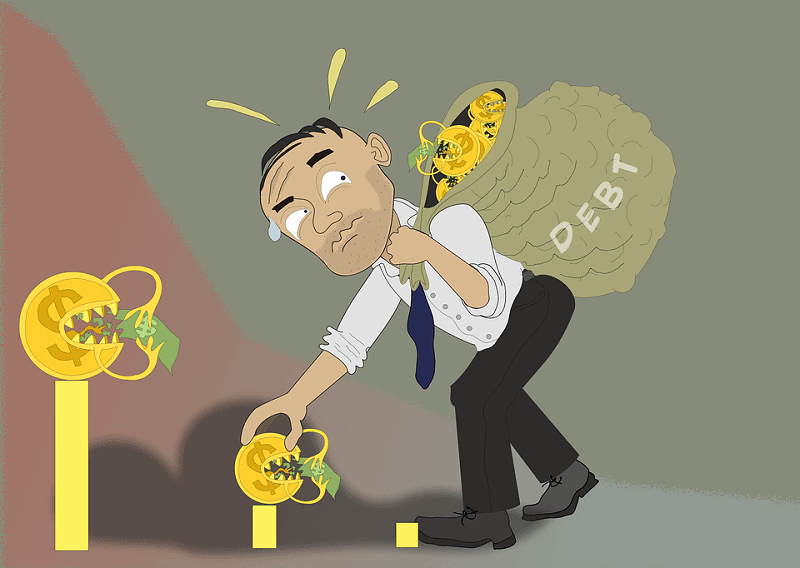 If you have no other option you’ll take a bad credit loan. But it isn’t the end of the world.
If you have no other option you’ll take a bad credit loan. But it isn’t the end of the world.
Bad credit loan isn’t the end of the world. Here are several ways how to overcome them. I’m gonna introduce some of them.
What is a bad credit loan?
In the first place, let me be clear about what is a bad credit loan.
A bad credit loan is a relief option for consumers whose low credit scores limit their borrowing options. In other words, a bad credit loan, or just another name for a personal loan, can secure you out of a financial emergency. Even if your credit score is lower than you would like it.
The good thing is that you can get a loan with bad credit, but it’s harder to get a good deal.
Yes, I know! Nobody likes to be judged. But when it comes to loans, creditors are going to look deep into your credit history and make a decision about whether or not to lend to you.
They need to define how risky it would be to lend money to a borrower. And if you’ve got bad credit, you could expect to show you the exit space. But, even if you have bad credit, there may be ways to get a loan. Here’s how.
You can get a loan from a bank, but if you’re looking for a reasonable interest rate and adjustable qualifying requirements, you better don’t even think to open that door. Even than, you have several options available. But you have to know that loans are typically more expensive.
With low credit scores is easy to slip into expensive traps. But a bit of homework can help you avoid the problems. After you prove you’re able to repay on time, it shouldn’t be hard to rebuild credit so that it’s easier to borrow next time.
How credit scores and credit reports can fix bad credit loan
Keep in mind that bad credit has different meanings to different lenders. Lenders know your credit score, and you should too. So, check out your credit reports. Especially if your credit card issuer reports to the consumer credit bureaus. This is important because some of the information contained in them is necessary to calculate your credit scores.
You’ll want to make sure there are no incorrect derogatory marks on your reports before applying for a loan. The major consumer credit bureaus aren’t perfect, so it’s important to read your credit reports carefully. If there are false negative marks, you should contact the specific credit reporting company.
Along with correct information, the provider will remove the error.
Your credit scores are important, too. Your credit scores, along with other factors, can affect your approval odds for a loan and the terms you qualify for. Don’t be discouraged if your scores are not what you’d like. A little bit of work could help put your scores in better shape.
How to improve your credit status
So, it’s time to start improving your credit status. Your scores are calculated using different credit factors and scoring models. Just be focused on the factors with the greatest influence. For example, payment history is one of them, but check out everything to improve your credit overall score.
You can’t change the past, but make all of your current payments for at least the minimum amount. And on time. This is key for payment history.
Speaking about usage, keep the amount of debt you owe low compared to your total credit limit, ideally less than 30%. Maxed-out or over-the-limit lines of credit can be particularly harmful. Also, keeping old accounts open instead of closing accounts after they are paid off can help increase your credit history length.
Mix. Frankly, you shouldn’t apply for a new type of credit to influence your scores. But it can naturally grow over time as you experience major financial events, such as buying a home, for example.
But be careful. Applying for several new credit accounts in a short period of time can make you seem risky to lenders.
The best bet is opening new accounts only when necessary and when you know you can handle them responsibly.
Shop around to compare options
Shop around for loans, and include credit unions in your search. Those institutions may work with you even if you have bad credit. Credit unions are often smaller than large banks. Also, they are focused on the community. Usually, they will review your application personally and discuss it with you. If you sit across the desk from a human being, they can understand what you need.
So, it’s time to start shopping around for the best loan for you. Some people simply choose the first loan they’re approved for.
But, that could be a major mistake.
Different lenders may offer different interest rates and loan terms. Lenders have their own methods for evaluating these factors.
There is a selection of lenders and loan facilitators who can help low-credit applicants obtain affordable financing. But not all loan features are created equally.
For example, one lender may offer you a loan with a 19.99% annual percentage rate while another can offer you a loan with a 15.99% APR (annual percentage rate). If you don’t shop around and accept the first offer of 19.99% APR, you would be overpaying by 4 percentage points.
Shopping around for loans is easier than ever. We have the internet. Yes, you should check into your local options, such as banks and credit unions. But you can easily view the estimated loan terms of various online lenders in one place using the internet.
How to compare loan terms
If you have bad credit, the loan could be approved but also will cost you more. The lenders may recognize you as risky. Since personal loans for people with bad credit can be so much more expensive, it’s especially important to compare loan terms to find the best deal. To compare loan offers, there are a few basic terms to pay attention to.
Loan repayment period: Loan repayment period is the time frame in which you’ll have to repay the loan. Personal loans require fixed monthly payments for an established period. The longer the repayment period, the more interest you’ll pay, and the more the loan are likely to cost you.
Monthly payments: Monthly payments are determined by the amount you borrow, your interest rate, and your loan term. Make sure the payments are achievable.
Loan maximum and minimum: Lenders usually establish a minimum amount and maximum amount they’re willing to lend. A lender may not be well suitable for you if it won’t loan you enough money or if it requires you to borrow more than you want.
Annual Percentage Rate (APR): APR is the total cost you pay each year to borrow the money, including interest and fees. A lower APR means the loan will cost you less. If you want to take out a personal loan with bad credit, you’ll probably have a higher APR.
Try online lenders to fix bad credit loan
Peer-to-peer lending services are one option for getting a loan with bad credit. Instead of borrowing from banks, you can do it from individuals. They may be more willing to take the risk, but they’re not looking to lose their money.
These non-bank lenders have different risk tolerance and use different ways to evaluate your creditworthiness. Online loans evolve. They may approve you with lower credit scores.
Just be sure to avoid payday loans. They are costly short-term loans and they have heavy promotions online.
Use collateral
It isn’t the best choice, but if you have trouble getting approved, you may need to put up collateral. If you pledge something valuable, your lender will know you’re serious. In such a case, lenders will have a better chance of collecting on the loan because they can take your collateral and sell it.
But be extremely careful when pledging collateral. If you have a property, you can probably borrow against it. But the risks are worthy of your attention. If you can’t make all of your payments, you might be forced out of your home. Think twice to avoid making a bad situation even worse.
Some con artists take advantage of you when you’re down. They particularly target people who are urgent to borrow. These lenders charge enormous fees, so make it almost impossible to dig yourself out of debt.
Sometimes, you won’t even deal with a real lender: Scammers advertise loans, but you need to pay steep application fees upfront. In the end, you don’t get approval, and you don’t get your money back. This is well-known as an advance fee scam. Don’t pay upfront fees to get a personal loan. Any processing fees should come out of your loan proceeds.
Think more than twice about a payday loan
If you need money right away, need an amount less than what a traditional lender might be willing to give, or have been denied a personal loan because of poor credit, you may be tempted to try a payday loan.
A payday loan is a short-term loan for a small amount — usually $100 to $500 — that you secure by giving the lender a post-dated check or electronic access to automatically withdraw your bank account. The loan is usually due on your next pay date, along with fees. Depending on the state, payday lenders can charge from $10 to $30 per $100 you borrow.
According to research by The Pew Charitable Trusts, for example, if a payday lender charges you $15 for every $100 you borrow per two weeks, it amounts to an APR of 391%. The Pew research found that fees from online lenders can be even higher, averaging an APR of 652% as of April 2012.
Never mind where do you live, a payday lender may not check your credit in order to approve you for a loan. Many only require you to be an adult with an active bank or prepaid card account. Also, they will ask for proof of income and valid identification. It may be easy to get a payday loan when you have bad credit, but the high cost could make it difficult to repay.
Don’t take out a payday loans
Some studies found that many payday loan borrowers can’t repay their loans without taking out another payday loan.
High-cost payday lending is prohibited in some countries. Others set limits on how much payday lenders can loan.
The regulation varies from country to country.
If your credit scores are low and you need a loan right away, finding an online lender or some other source offering personal loans for borrowers with bad credit could be your best option.
Just proceed with caution and be sure to compare the terms of each loan to find the most affordable lender. But, if you can’t find such an option that you can easily repay, it may be better to wait and work on your credit.
Applying for loans, especially if done the wrong way, can further damage your credit.




 If you have no other option you’ll take a bad credit loan. But it isn’t the end of the world.
If you have no other option you’ll take a bad credit loan. But it isn’t the end of the world.